Tai Chi eases anxiety and sharpens focus through its unique blend of slow, deliberate movements and mindful breathing. As you practice, you're engaging both body and mind, redirecting thoughts away from stressors. The controlled breathing activates your parasympathetic nervous system, promoting relaxation and reducing stress hormones. Meanwhile, the meditative nature of Tai Chi quiets mental chatter, enhancing concentration and cognitive function. Regular practice strengthens your ability to stay present, improves emotional regulation, and boosts overall mental clarity. By integrating Tai Chi into your daily routine, you'll cultivate a sense of calm and heightened awareness that extends far beyond your practice sessions.
Understanding Tai Chi's Ancient Roots
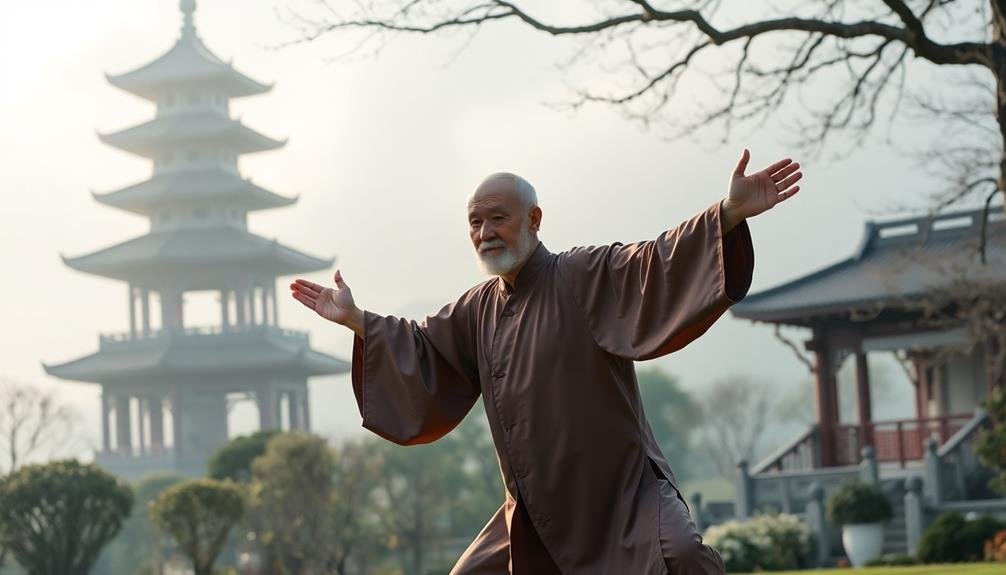
Tai Chi's roots frequently trace back over 2,000 years to ancient China. This ancient practice originated as a martial art, combining slow, deliberate movements with deep breathing and meditation.
It's believed to have been developed by Taoist monk Zhang Sanfeng, who drew inspiration from observing a snake and a crane in combat.
Over time, Tai Chi evolved into various styles, each emphasizing different aspects of the practice. The most common styles include Yang, Chen, Wu, and Sun.
These styles share core principles but differ in their movement sequences and energy flow.
Tai Chi's philosophy is deeply rooted in the concept of "qi" or life energy. Practitioners aim to balance their qi through controlled movements and breathing, promoting harmony between body and mind.
This balance is thought to be essential for overall well-being and longevity.
As Tai Chi spread beyond China, it gained popularity as a form of moving meditation and gentle exercise.
Today, you'll find people practicing Tai Chi in parks, gyms, and wellness centers worldwide, benefiting from its stress-reducing and focus-enhancing effects.
Mind-Body Connection in Tai Chi
A fundamental principle of this ancient practice is the intimate connection between mind and body. Tai Chi emphasizes the integration of physical movements with mental focus, creating a harmonious balance that can greatly reduce anxiety and enhance concentration.
As you practice, you'll notice how your thoughts and movements become increasingly synchronized, leading to a state of mindfulness that carries over into your daily life.
The mind-body connection in Tai Chi is cultivated through:
- Slow, deliberate movements that demand your full attention
- Deep, rhythmic breathing that calms your nervous system
- Visualization techniques that engage your imagination
- Meditation-like focus on your body's sensations and energy flow
Slow Movements and Breathing Techniques
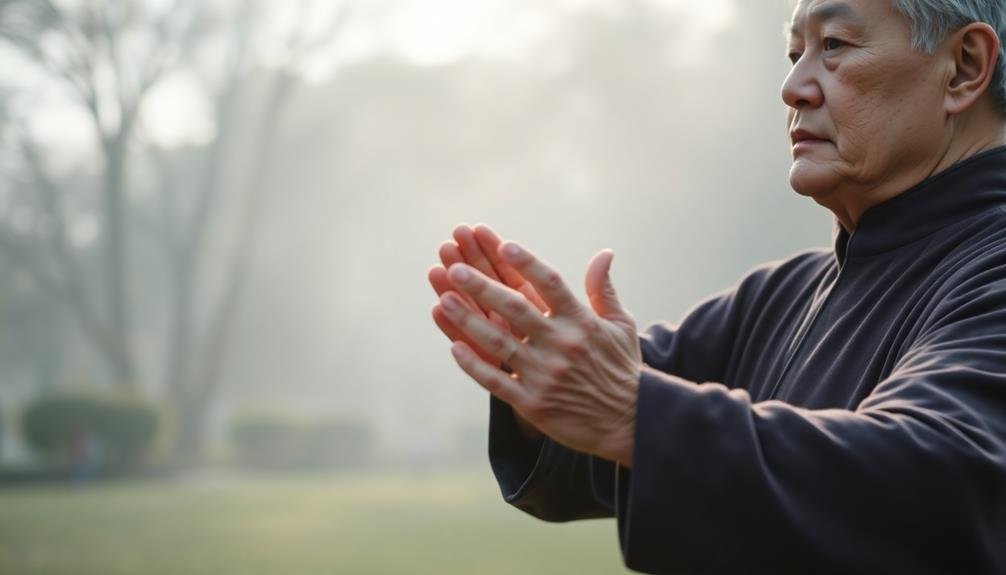
When you practice Tai Chi, you'll quickly discover that its slow, deliberate movements and focused breathing techniques are at the heart of its effectiveness for managing anxiety and improving focus. These elements work together to calm your mind and center your attention on the present moment.
The slow movements in Tai Chi require you to maintain balance and control, engaging your entire body and mind. As you perform each posture, you'll concentrate on your body's position, muscle engagement, and weight distribution. This heightened awareness helps redirect your thoughts away from anxious feelings and enhances your ability to focus.
Breathing techniques in Tai Chi are equally important. You'll learn to synchronize your breath with your movements, promoting relaxation and oxygenation throughout your body. This conscious breathing helps regulate your nervous system, reducing stress and anxiety.
| Benefit | Slow Movements | Breathing Techniques |
|---|---|---|
| Anxiety | Calms racing thoughts | Regulates nervous system |
| Focus | Enhances body awareness | Improves mental clarity |
| Physical | Increases balance and strength | Boosts oxygen flow |
Tai Chi's Impact on Stress
You'll find that Tai Chi's impact on stress is profound and far-reaching. This ancient Chinese practice combines gentle movements, deep breathing, and mindfulness to create a powerful stress-reduction technique. As you engage in Tai Chi, you'll notice your body and mind gradually releasing tension and entering a state of calm.
Tai Chi's stress-relieving benefits stem from several factors:
- Mindful movement: By focusing on slow, deliberate movements, you're forced to be present in the moment, distracting your mind from stressors.
- Controlled breathing: Deep, rhythmic breathing activates your parasympathetic nervous system, promoting relaxation and reducing stress hormones.
- Meditative aspect: The meditative nature of Tai Chi helps quiet your mind and reduce racing thoughts.
- Physical exercise: The gentle yet consistent movement promotes endorphin release, improving mood and reducing stress.
Regular Tai Chi practice can lead to long-term stress management benefits. You'll likely experience improved sleep quality, enhanced emotional regulation, and a greater sense of overall well-being.
Neurological Benefits of Tai Chi

Beyond its stress-relieving properties, Tai Chi offers significant neurological benefits. As you practice this ancient Chinese martial art, you're actively engaging and rewiring your brain.
Studies show that Tai Chi can increase gray matter volume in areas associated with memory, learning, and emotional regulation. You'll likely experience improved cognitive function, including enhanced attention span and faster processing speed.
Tai Chi's slow, deliberate movements require intense focus, which strengthens your ability to concentrate and stay present. This mindfulness aspect of Tai Chi also helps reduce mental chatter and anxiety.
Regular practice can boost your executive function skills, such as decision-making and problem-solving. You may notice better balance and spatial awareness as Tai Chi strengthens the neural pathways controlling these functions.
Additionally, the art form's emphasis on breath control and meditation-like states can promote neuroplasticity, allowing your brain to form new connections and adapt more easily to challenges.
Tai Chi's neurological benefits extend to neuroprotection, potentially slowing cognitive decline in older adults and reducing the risk of neurodegenerative diseases.
Improving Balance and Coordination
Balance and coordination are fundamental aspects of Tai Chi that can greatly improve with regular practice. As you engage in the slow, deliberate movements of Tai Chi, you're constantly challenging your body to maintain stability and control. This practice enhances your proprioception, or body awareness, which is vital for maintaining balance in everyday life.
Tai Chi's focus on weight shifting and controlled movements strengthens the muscles responsible for balance, particularly in your legs and core. You'll find that as you progress, you're able to stand on one leg for longer periods and move more gracefully through your daily activities.
The practice also improves your coordination by:
- Enhancing mind-body connection
- Increasing spatial awareness
- Refining motor control
- Improving reaction time
These improvements aren't just beneficial for your Tai Chi practice; they translate into real-world advantages. You'll likely notice enhanced stability when walking on uneven surfaces, climbing stairs, or performing complex physical tasks.
For older adults, this improved balance and coordination can greatly reduce the risk of falls, contributing to overall health and independence.
Tai Chi for Mental Clarity
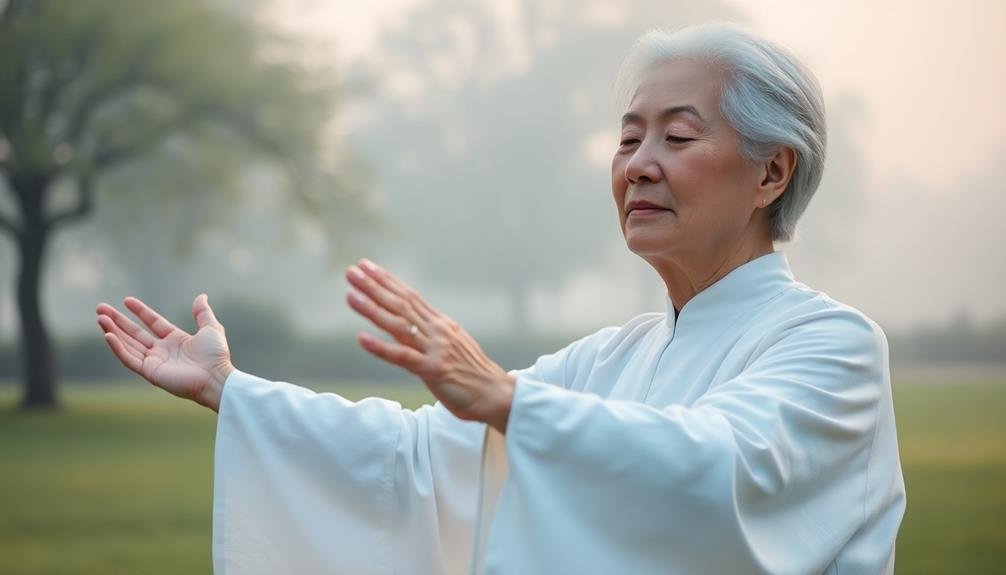
Through the practice of Tai Chi, many practitioners discover a pathway to enhanced mental clarity. As you engage in the slow, deliberate movements, you'll find your mind becoming more focused and alert. The combination of deep breathing and intentional gestures helps clear mental clutter, allowing you to concentrate on the present moment.
Tai Chi's meditative aspects encourage you to quiet your inner dialogue and let go of distracting thoughts. This mental stillness can lead to improved cognitive function and decision-making skills. You'll likely notice an increased ability to concentrate on tasks and solve problems more efficiently.
The practice also promotes the release of endorphins, which can boost your mood and reduce stress. As you become more adept at Tai Chi, you'll develop a greater awareness of your body and mind connection. This heightened self-awareness can help you recognize and manage stress triggers more effectively.
Regular Tai Chi practice may even contribute to long-term brain health. Studies suggest it can improve memory and potentially reduce the risk of cognitive decline as you age.
Cultivating Mindfulness Through Practice
With consistent Tai Chi practice, you'll develop a strong foundation for mindfulness. As you move through the graceful poses, you're encouraged to focus on your breath and bodily sensations, anchoring yourself in the present moment.
This heightened awareness extends beyond your practice sessions, seeping into your daily life and helping you manage stress more effectively.
Tai Chi's mindfulness benefits are multifaceted:
- Improved body awareness: You'll become more attuned to subtle physical sensations, helping you identify and address tension before it escalates.
- Enhanced emotional regulation: By observing your thoughts without judgment, you'll develop the ability to respond to challenging situations calmly.
- Increased focus: Regular practice strengthens your ability to concentrate on the task at hand, reducing mental clutter.
- Greater self-compassion: As you learn to accept your limitations during practice, you'll cultivate a kinder attitude towards yourself in other areas of life.
Anxiety Reduction and Tai Chi
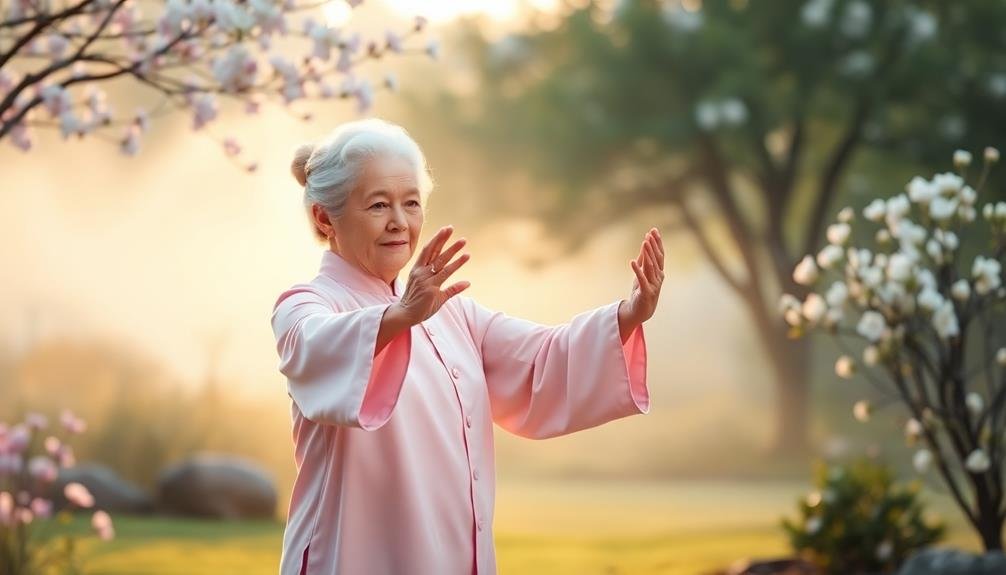
Serenity often eludes those grappling with anxiety, but Tai Chi offers a powerful antidote. As you engage in the slow, deliberate movements of this ancient Chinese practice, you'll find your racing thoughts beginning to calm. The focus required for each posture naturally draws your attention away from worry-inducing thoughts, anchoring you in the present moment.
Tai Chi's emphasis on deep, rhythmic breathing activates your parasympathetic nervous system, triggering a relaxation response. This helps lower cortisol levels, reducing stress and anxiety symptoms. The gentle, flowing movements also release tension held in your muscles, further promoting physical and mental relaxation.
Regular practice can rewire your brain's stress response. You'll develop greater emotional resilience and a heightened ability to remain calm under pressure.
Tai Chi's meditative aspects teach you to observe your thoughts without judgment, allowing anxious feelings to pass rather than escalate. As you progress, you'll likely notice improved sleep quality, reduced muscle tension, and a greater overall sense of well-being.
These benefits compound over time, making Tai Chi a valuable long-term strategy for managing anxiety and cultivating inner peace.
Boosting Focus With Regular Practice
Regular Tai Chi practice can greatly enhance your ability to focus.
As you consistently engage in the slow, deliberate movements, you'll notice your concentration improving over time.
The repetitive nature of Tai Chi exercises cultivates mindfulness, allowing you to sharpen your mental acuity and maintain better focus in your daily life.
Improved Concentration Over Time
As you practice Tai Chi consistently, you'll notice a gradual improvement in your ability to concentrate. This enhancement in focus isn't limited to your Tai Chi sessions; it extends to various aspects of your daily life. The mindful nature of Tai Chi trains your brain to stay present and attentive, skills that translate well to other tasks requiring concentration.
Over time, you'll experience:
- Increased ability to filter out distractions
- Improved memory retention and recall
- Enhanced problem-solving skills
- Greater mental stamina for prolonged focus
These benefits stem from the meditative aspects of Tai Chi, which encourage you to focus on your breath, movements, and energy flow.
As you continue to practice, you'll find it easier to enter a state of flow, where concentration comes naturally and effortlessly. This improved focus can help you perform better at work, study more efficiently, and engage more deeply in conversations and relationships.
The key is consistency; regular practice allows your brain to rewire itself, strengthening neural pathways associated with attention and concentration. As a result, you'll find yourself better equipped to handle complex tasks and maintain focus in challenging situations.
Mindfulness Through Repetitive Movements
Through the repetitive movements of Tai Chi, you'll discover a powerful path to mindfulness and enhanced focus. As you practice the flowing sequences, your mind naturally settles into a state of present-moment awareness. This mindfulness allows you to let go of distracting thoughts and worries, creating space for improved concentration.
The slow, deliberate motions of Tai Chi require your full attention, training your brain to stay focused on the task at hand. You'll notice that as you become more proficient in the movements, your ability to maintain focus in other areas of life also improves. The repetitive nature of the practice reinforces neural pathways associated with concentration, making it easier to enter a focused state when needed.
Moreover, Tai Chi's emphasis on breath control further enhances mindfulness. By synchronizing your movements with your breath, you'll cultivate a deeper mind-body connection. This integration helps quiet mental chatter and promotes a sense of calm alertness.
As you regularly engage in Tai Chi, you'll find that this state of mindful focus becomes more accessible in your daily life, helping you navigate challenges with greater clarity and composure.
Integrating Tai Chi Into Daily Life
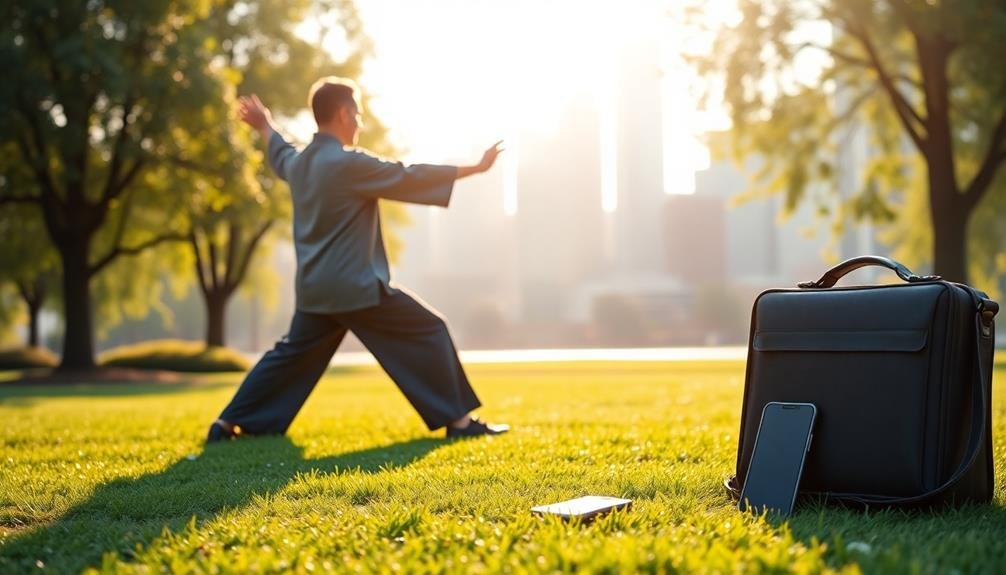
You can easily incorporate Tai Chi into your daily routine through simple, brief exercises.
Practice mindful movements during everyday activities, like standing in line or waiting for your coffee to brew.
Simple Daily Tai Chi
In light of Tai Chi's benefits, incorporating simple practices into your daily routine can considerably enhance your anxiety management and focus. You don't need to dedicate hours to reap the rewards; even short, consistent sessions can make a significant difference.
Start by setting aside 10-15 minutes each day, preferably in the morning or evening, to practice these simple Tai Chi exercises.
- Begin with mindful breathing: Stand with your feet shoulder-width apart, close your eyes, and take deep, slow breaths for 1-2 minutes.
- Practice "Parting the Wild Horse's Mane": Shift your weight to one leg, then slowly move your arms as if you're parting curtains, alternating sides.
- Try "Cloud Hands": Move your hands in circular motions at chest level, as if you're gently pushing clouds away.
- End with "Standing Like a Tree": Stand still with your knees slightly bent, arms raised as if hugging a tree, and hold for 1-2 minutes.
Mindfulness Through Movement
Beyond dedicated practice sessions, Tai Chi's principles can be seamlessly woven into your daily activities, fostering mindfulness and reducing anxiety throughout the day.
As you walk, focus on your posture, aligning your spine and relaxing your shoulders. Feel the connection between your feet and the ground, and synchronize your breath with your steps. This simple practice can transform mundane tasks into meditative experiences.
When standing in line or waiting for public transport, practice Tai Chi's weight-shifting exercises. Subtly shift your weight from one foot to the other, maintaining balance and awareness of your body's movements.
During work breaks, incorporate gentle arm movements inspired by Tai Chi forms. These can help release tension in your shoulders and neck while promoting circulation.
Even while seated, you can practice mindful breathing and engage your core muscles. Pay attention to your body's alignment and make micro-adjustments to maintain proper posture.
Frequently Asked Questions
Can Tai Chi Help With Weight Loss?
Yes, Tai Chi can help with weight loss. You'll burn calories through gentle, continuous movement. It improves metabolism, builds muscle, and reduces stress-related eating. Combine it with a healthy diet for best results in your weight loss journey.
Is Tai Chi Suitable for People With Physical Disabilities?
Yes, you can practice Tai Chi if you have physical disabilities. It's adaptable to various abilities and can be modified for seated or standing positions. You'll find many instructors who specialize in teaching Tai Chi to people with disabilities.
How Long Does It Take to See Benefits From Practicing Tai Chi?
You'll start noticing benefits from tai chi within a few weeks of regular practice. You might experience improved balance and reduced stress quickly, but it can take months to see significant physical and mental health improvements.
Are There Any Age Restrictions for Learning Tai Chi?
You'll be pleased to know there are no age restrictions for learning Tai Chi. It's suitable for people of all ages, from children to seniors. You can start at any time and adapt the practice to your fitness level.
Can Tai Chi Be Practiced Alongside Other Forms of Exercise or Meditation?
Yes, you can definitely practice Tai Chi alongside other exercises or meditation. It's a versatile discipline that complements various fitness routines and mindfulness practices. You'll find it enhances your overall well-being when combined with other activities you enjoy.
In Summary
You've discovered the power of Tai Chi to calm your mind and sharpen your focus. By embracing this ancient practice, you're tapping into a wealth of physical and mental benefits. As you continue your Tai Chi journey, you'll find yourself better equipped to handle stress, reduce anxiety, and improve concentration. Don't hesitate to incorporate these gentle movements into your daily routine. You'll soon experience the transformative effects of Tai Chi on your overall well-being.





Leave a Reply